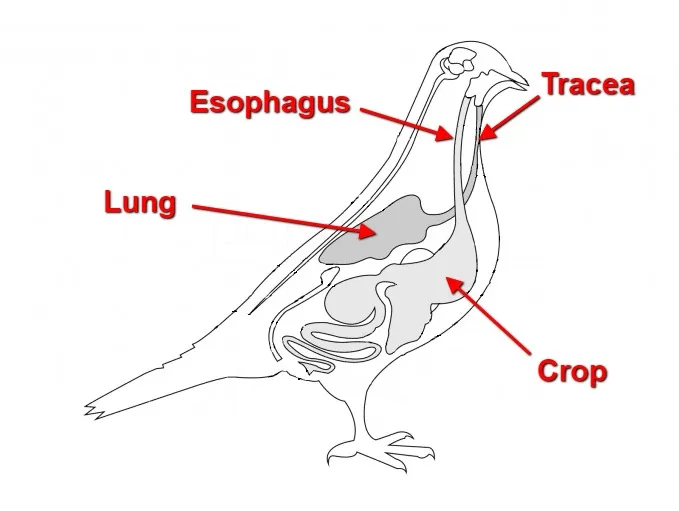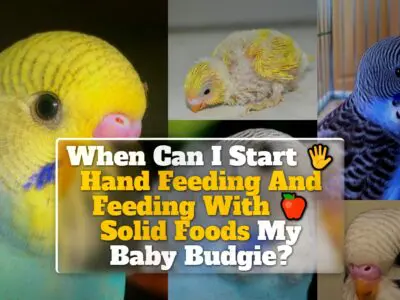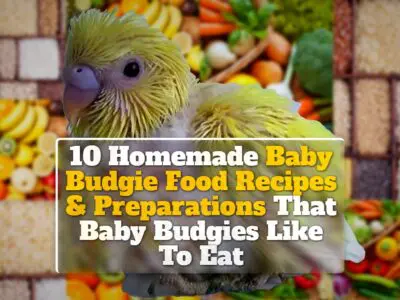Your budgie may choke due to various reasons such as ingesting large food pieces, foreign objects, or due to underlying respiratory issues.
Signs include gagging, regurgitation, or vomiting.
Hand-fed baby budgies are more at risk due to improper feeding techniques.
This content delves into the reasons why budgies choke, the signs of choking, and why hand-fed baby budgies are more at risk.
It has been thoughtfully curated from personal experiences, extensive readings, and observations, intending to provide clarity to budgie owners or enthusiasts.
Because of the systems that budgies have, they usually do not suffocate in situations where mammals suffocate.
Instead, they may be physically challenged.
This strain may appear from the outside as if it is choking/suffocating.
However difficult it is, it is possible for budgies to suffocate.

What Are The Causes Of Choking In Budgies?
Delving into the causes of choking in budgies, one might discover several factors contributing to this somewhat rare event.
We as bird enthusiasts and caretakers need to be aware of these possibilities to ensure the health and safety of our feathery friends.
Foreign Objects
To begin, budgies are naturally curious creatures, often exploring their environment with their beaks.
However, this can lead to the ingestion of foreign objects, which can become lodged in their crop or throat.
Items such as loose fibers, strings, or small toy parts might accidentally be ingested, resulting in a choking hazard.
Respiratory Issues, Infections, or Disease
Another major cause of choking in budgies is respiratory issues.
A budgie suffering from respiratory infections or inflammation may experience discomfort while swallowing, leading to difficulties in eating and potentially choking.
For example, Aspergillosis, a common fungal disease in budgies, can cause severe respiratory distress and lead to choking-like symptoms.
Crop Disorders
Moving on, crop disorders are another common cause of choking in budgies.
The crop, a pouch in a budgie’s neck for temporary food storage, may occasionally fail to empty properly due to disorders such as crop stasis or sour crop.
In such cases, the budgie may appear to be choking due to the sensation caused by a full crop.
Avian Goiter
The occurrence of avian goiter or thyroid hyperplasia also presents a choking hazard in budgies.
This condition can cause a budgie’s throat to swell, potentially impeding their ability to swallow and leading to choking-like symptoms.
Tumors
In some cases, tumors can cause obstructions in a budgie’s throat or crop, leading to choking.
Whether benign or malignant, these growths can interfere with the normal swallowing process and may need to be addressed with veterinary intervention.
Poor Diet
Interestingly, a poor diet can also contribute to a budgie’s choking risk.
A diet deficient in certain nutrients can lead to health problems that might make it more difficult for a budgie to swallow, thereby increasing the risk of choking.
Hence, it’s always essential to provide our budgies with a well-balanced diet.
Injury or Abnormality
At times, an injury or abnormality in the budgie’s throat or crop can lead to difficulties in swallowing or an increased choking risk.
Although relatively rare, any changes in the budgie’s eating habits or behaviors should be noted and checked by a vet to rule out any potential issues.
Human Interventions
Human interventions may sometimes inadvertently pose a choking risk to budgies.
Misguided actions, such as trying to force-feed inappropriate food items, can unintentionally lead to choking.
It’s essential to understand that while our intentions might be good, lack of knowledge can sometimes harm our feathered friends.
This is why education and understanding of appropriate bird care practices are critical to ensuring the well-being of our budgie companions
What Are The Signs Of Choking In Budgies?
Budgies, like any other animal, may display specific signs when experiencing choking.
Knowing what to look for can help identify the problem and get your pet the assistance it needs promptly.
Gagging Or Choking Sounds
One of the most obvious signs is the presence of gagging or choking sounds.
A budgie might make a distinct sound as it attempts to clear the blockage in its throat.
This could be a repetitive cough-like noise or a wheezing sound as it struggles to breathe.
If you notice this behavior, immediate action should be taken to ensure your budgie’s safety.
Difficulty Swallowing
Difficulty swallowing or eating may also be a sign that your budgie is choking.
The bird may repeatedly attempt to swallow, only to regurgitate or spit out its food.
You may notice the bird making unusual head movements or acting distressed during feeding time.
Any sudden changes in your budgie’s eating habits warrant attention.
Neck Extending
Another symptom to watch out for is neck extending.
If a budgie is choking, it may stretch its neck out and upwards, trying to dislodge whatever is causing the blockage.
This action is accompanied by apparent distress and should be taken as an immediate sign of trouble.
Always be alert to any significant changes in your budgie’s body language or behavior.
Regurgitation
Regurgitation, or the ejection of food from the mouth, can also indicate choking.
This differs from vomiting, as the ejected material comes from the esophagus and not the stomach.
The food is often undigested, and the act is typically not accompanied by retching.
It can result from an attempt to clear the throat or esophagus from a foreign object or a large chunk of food.
Cough
A cough, though uncommon in birds, can be a sign of choking in budgies.
Budgies do not cough in the same way humans do, but they may make a similar noise or motion if they are choking.
If you notice a cough-like behavior or noise, it could be your bird trying to clear its airway.
Excessive Drooling
Excessive drooling is another potential sign of choking in budgies.
Budgies normally don’t drool, so noticeable wetness around their beak, especially during or after feeding, may be a sign that something’s not quite right.
This could be a result of an inability to swallow properly due to a blockage in their throat.
Difficulty in Breathing: Open-Mouthed, Rapid, Labored, or Gasping
When a budgie is choking, the immediate impact is typically seen on its respiration.
They resort display signs of rapid, labored breathing.
This occurs when the airway is partially blocked, and the bird is trying to draw in more air to compensate.
In more severe cases where the blockage is near complete, the budgie might be seen gasping for air, indicating a desperate attempt to intake oxygen.
In all these instances, the budgie would appear visibly distressed, struggling for every breath.
These signs should never be ignored as they indicate serious respiratory distress, often tied to choking.
Distressed Behavior
Distressed behavior could be a sign of a variety of issues, including choking.
If your budgie is acting unusually restless, anxious, or agitated, it may be experiencing discomfort due to a blockage in its throat.
Pawing At The Beak
If a budgie is pawing at its beak, this is a clear sign of distress that may be associated with choking.
The bird may be trying to use its foot to dislodge something that’s caught in its throat.
Why Are Hand-Fed Baby Budgies At Greater Risk Of Choking?
Hand-fed baby budgies are at a higher risk of choking compared to adult birds due to a variety of reasons including inexperienced feeding technique, inability to regulate food intake, improper food consistency, and the possibility of force-feeding.
Inexperienced Feeding Technique
A major reason for increased risk is the inexperienced feeding technique.
Hand-feeding a baby budgie requires specific knowledge and experience.
The person feeding the budgie must know how to administer the food properly.
Incorrect feeding can lead to food getting into the budgie’s trachea instead of its esophagus, leading to potential choking hazards.
Inability To Regulate Food Intake
Baby budgies, especially those that are hand-fed, often have an inability to regulate food intake.
They may not know when they are full and can continue to eat until they become overfilled, potentially leading to choking.
Improper Food Consistency
Another risk is the improper food consistency.
When hand-feeding baby budgies, the food needs to be of the right consistency, neither too thick nor too runny.
Food that is too thick might be difficult for the baby budgie to swallow, leading to potential choking.
On the other hand, food that’s too runny might be inhaled into the trachea instead of being swallowed, which also poses a risk of choking.
Force-Feeding
Force-feeding can be another risk factor for choking in hand-fed baby budgies.
If a baby budgie is not hungry or not ready to eat, force-feeding can cause the bird to choke.
It’s important to let the baby bird eat at its own pace to minimize this risk.
📺 Video: Budgie Is Looks Like It Is Vomiting
FAQs
Why Is The Risk Of Choking In Budgies Less Than In Mammals?
The risk of choking in budgies is generally less than in mammals due to their unique anatomical structure.
Unlike mammals, budgies have a different configuration of their respiratory system.
Budgies, like all birds, have a respiratory system that includes an organ called the ‘crop’.
The crop is an expanded, thin-walled part of a bird’s alimentary tract used for the storage of food prior to digestion.
This allows budgies to store food and gradually move it to the stomach, which can reduce the chance of choking.
Moreover, the epiglottis, a flap of cartilage located at the base of the tongue that prevents food from entering the windpipe, is not present in birds as it is in mammals.
Instead, budgies and other birds have a structure known as the glottis.
The glottis is better equipped to seal the windpipe during eating, thus preventing food from entering the respiratory tract.
However, despite the lower risk compared to mammals, budgies can still choke on food or foreign objects, and care should be taken to prevent these instances.


![Can Budgies Get High? [Signs, Avoiding, Getting Stoned]](https://www.petiska.com/wp-content/uploads/2022/07/can-budgies-get-high-signs-avoiding-getting-stoned-1658920985-400x300.jpg)
